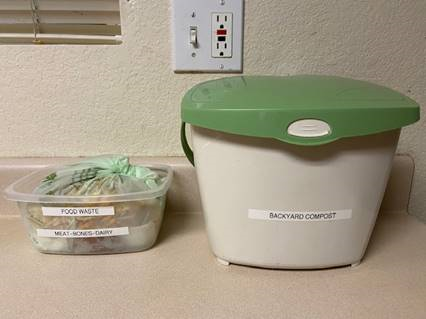Yes, it’s required by law that all residents put any food scraps, food-soiled paper, and yard trimmings, regardless if the amount is minimal, in the Organics cart starting July 2022. Organic materials are no longer accepted in the Garbage cart unless eligible for a low population census tract waiver. Please see section "Low Population Census Tract Waiver for Organics Collection" for more information.
Can I use compostable bags to collect my food waste?
Yes, although, residents can also use brown paper bags or newspaper to collect food scraps. Residents have the option to purchase and use compostable bags to collect food waste. Compostable bags must be BPI-certified to meet the ASTM D6400 standard. Look for “BPI” or “ASTM D6400” on the packaging label to ensure it meets this standard. ASTM D6400 is the standard specification to make sure the material used in the bag is compostable at local facilities.
With organics collection and recycling, what will go into my Garbage cart?
Only items that cannot be placed in the Recycling cart or items that are not accepted in the Organics cart should be put in the Garbage cart. Items include, but are not limited to plastic bags, diapers, paper milk and juice cartons, pet waste, Styrofoam, etc. If you are unsure which cart an item should be disposed in, use our easy “How Do I Get Rid Of…” search tool on our website or mobile app.
Can food packaging go in the Organics cart, or do I need to open the package and empty the food waste in the Organics cart?
Only food scraps, food-soiled paper (uncoated) and yard trimmings are accepted in the Organics cart. Remove the food from the packaging such as aluminum cans, plastic wrap, Styrofoam, coated paper, twist ties, rubber bands, etc, to avoid contaminating the resulting compost product. Packaging is not accepted in the Organics cart and should be placed in the Recycling cart if appropriate, or placed in the Garbage cart.
Can I still use my organic material for backyard composting?
We applaud our residents efforts to manage organic materials. All of our residential customers are required to participate in weekly organics collection beginning July 2022 for compliance with state law. For those with backyard composting, place organic materials that are not typically managed in home composting systems – such as food-soiled paper, greasy pizza boxes, and meat/bone or cheese items - in the Organics cart.
Below is an example of a backyard composter who uses the kitchen pail to collect vegetable, fruit and other food scraps used in backyard composting and separates meat scraps, bones and dairy products into a BPI-certified compostable bag for the Organics cart, which the County has these items safely composted to properly breakdown those items.

How do I find out about what to do with organics materials not specifically listed, such as shredded paper, wood chopsticks, or real cork?
If you are not sure about which cart to use for an item, check out our "How Do I Get Rid Of..." tool. Here are answers to these items: Put shredded paper in a paper bag before putting in the Organics cart to prevent litter. If chopsticks are wood and not painted or laminated, they should go in the Organics cart - if treated, add them to the Garbage cart. For real cork from wine bottles, those can go in the Organics cart - if plastic, those go in the Garbage cart.
